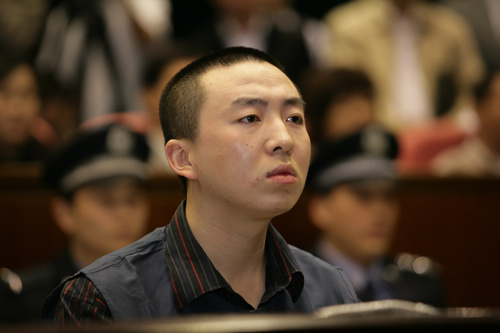|
 |
|
ON TRIAL: Xu Ting listens as a judge reads the ruling on his case in a court in Guangzhou, Guangdong Province, on March 31, 2008 (LUO WEIXIONG) |
The Supreme People's Court of China, the country's highest judicial organ, has initiated a new reform by releasing a set of "guiding cases" to help judges make their rulings.
On December 21, 2011, the Supreme People's Court published the first four guiding cases, including two civil cases and two criminal cases. Judges are required to refer to them while adjudicating.
The cases were selected according to the Provisions of the Supreme People's Court on Guiding Cases. The provisions, released in November 2010, say that the key principles for adjudication established in these cases should be referred to by judges when hearing similar cases and may be incorporated as a basis for the reasoning in final rulings.
There are two legal systems in the world: the common law system and the civil law system.
Under the common law system, judges are bound to follow the reasoning used in relevant preceding cases. Where no legislative statute or precedent for rulings exist, judges in a precedent-based system have the authority to make law by creating a precedent.
In the civil law system, judges follow a codified body of general principles enacted by the legislature. A judge deciding on a given case has the freedom to interpret the text of a statute independently, but has no authority to act where there is no statute.
But in recent years, the two legal systems have been drawing on each other.
"Though China adopts the civil law system, it has recently begun to give more weight to legal precedents. Nonetheless, the guiding cases are not to make laws but to interpret laws," said Hu Yuteng, Director of the Research Department of the Supreme People's Court.
Courts in China have always attached importance to the role of settled cases in future adjudication, said Wu Guangxia, head of the Case Guidance Office under the Research Department of the Supreme People's Court. In 1985, the Supreme People's Court began periodically publishing typical cases for courts at various levels to refer to. Local courts have also published lists of major past cases.
According to Ma Kai, a Beijing-based lawyer, the newly published guiding cases differ from all other cases for reference published before December 21, 2011, because they were selected according to a distinct procedure and, more importantly, they have greater guiding power.
"It is now obligatory for judges to refer to the guiding cases when hearing similar cases and judges failing to do so should present convincing written explanations for their rulings. The cases previously published by courts at various levels didn't carry such requirements. The guiding cases can also be cited in ruling instruments, while previously published cases cannot," Ma said.
The first four guiding cases were chosen by the Case Guidance Office of the Supreme People's Court after a meticulous process.
The office first selected candidate cases from more than 100 cases submitted by courts at various levels, and then it solicited feedback from relevant departments and scholars. The candidate cases were then reported to the Supreme People's Court's supervising president or vice presidents, and approved by the court's Judicial Committee before being published.
The first four published guiding cases respectively involve the violation of a contract between buyer and seller in second-hand home transaction, the breach of a mediation agreement in a civil case, a bribery case, and a case in which a man who was convicted of unpremeditated murder was given a death sentence with two years of probation.
| 